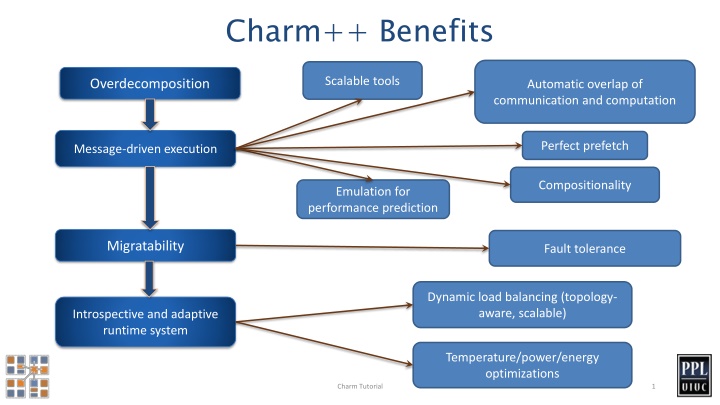
Harnessing Charm++ for Scalable Tools and Efficient Communication
Explore the benefits of Charm++ for scalable tools, overdecomposition, automatic overlap of communication and computation, perfect prefetching, message-driven execution, compositionality, and more. Discover the impact on communication, decomposition challenges, and the importance of parallel composition in high-performance computing applications.
Download Presentation

Please find below an Image/Link to download the presentation.
The content on the website is provided AS IS for your information and personal use only. It may not be sold, licensed, or shared on other websites without obtaining consent from the author. If you encounter any issues during the download, it is possible that the publisher has removed the file from their server.
You are allowed to download the files provided on this website for personal or commercial use, subject to the condition that they are used lawfully. All files are the property of their respective owners.
The content on the website is provided AS IS for your information and personal use only. It may not be sold, licensed, or shared on other websites without obtaining consent from the author.
E N D
Presentation Transcript
Charm++ Benefits Scalable tools Overdecomposition Automatic overlap of communication and computation Perfect prefetch Message-driven execution Compositionality Emulation for performance prediction Migratability Fault tolerance Dynamic load balancing (topology- aware, scalable) Introspective and adaptive runtime system Temperature/power/energy optimizations Charm Tutorial 1
Locality and Prefetch Objects connote and promote locality Message-driven execution A strong principle of prediction for data and code use Much stronger than principle of locality Can use to scale memory wall: Prefetching of needed data: Into scratchpad memories, for example Processor 1 Scheduler Message Queue 2 Charm Tutorial
Impact on Communication Current use of communication network: Compute-communicate cycles in typical MPI apps The network is used for a fraction of time And is on the critical path Current communication networks are over-engineered by necessity P1 P2 BSP based application 3 Charm Tutorial
Impact on Communication With overdecomposition: Communication is spread over an iteration Adaptive overlap of communication and computation P1 P2 Overdecomposition enables overlap 4 Charm Tutorial
Decomposition Challenges Current method is to decompose to processors This has many problems Deciding which processor does what work in detail is difficult at large scale Decomposition should be independent of number of processors enabled by object based decomposition Let runtime system (RTS) assign objects to available resources adaptively 5 Charm Tutorial
Decomposition Independent of numCores Rocket simulation example under traditional MPI Solid Solid Solid . . . Fluid Fluid Fluid 1 2 P With migratable-objects: . . . Solid1 Solid2 Solid3 Solidn . . . Fluid1 Fluid2 Fluidm Benefit: load balance, communication optimizations, modularity 6 Charm Tutorial
Compositionality It is important to support parallel composition For multi-module, multi-physics, multi-paradigm applications What I mean by parallel composition B || C where B, C are independently developed modules B is parallel module by itself, and so is C Programmers who wrote B were unaware of C No dependency between B and C This is not supported well by MPI Developers support it by breaking abstraction boundaries E.g., wildcard recvs in module A to process messages for module B Nor by OpenMP implementations 7 Charm Tutorial
Without message-driven execution (and virtualization), you get either: Space Space- -division division B C Time 8 Charm Tutorial
OR: Sequentialization Sequentialization B C Time 9 Charm Tutorial
Parallel Composition: Parallel Composition: A1; (B || C ); A2 Recall: languages/paradigms, can overlap in time and on processors, without programmer having to worry about this explicitly Recall: different modules, written in different 10
